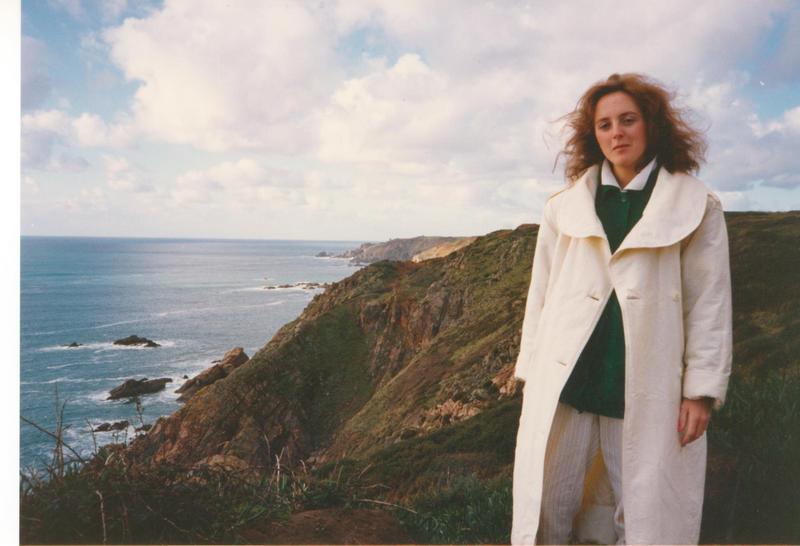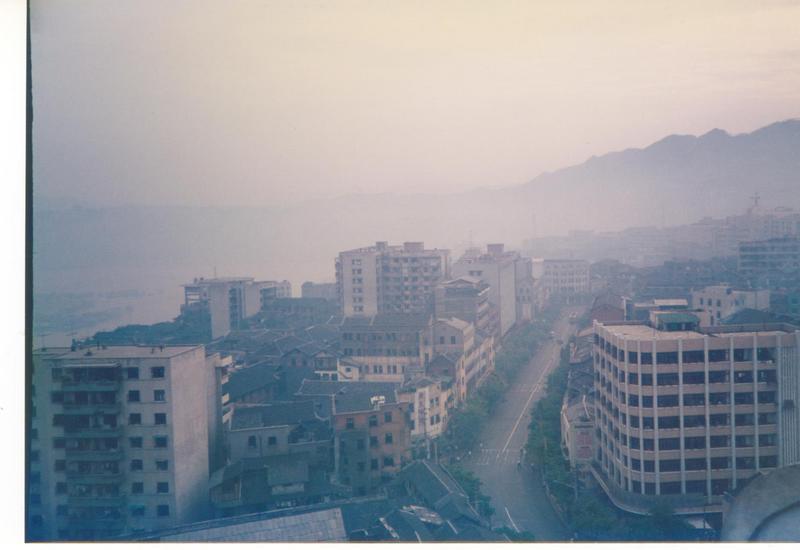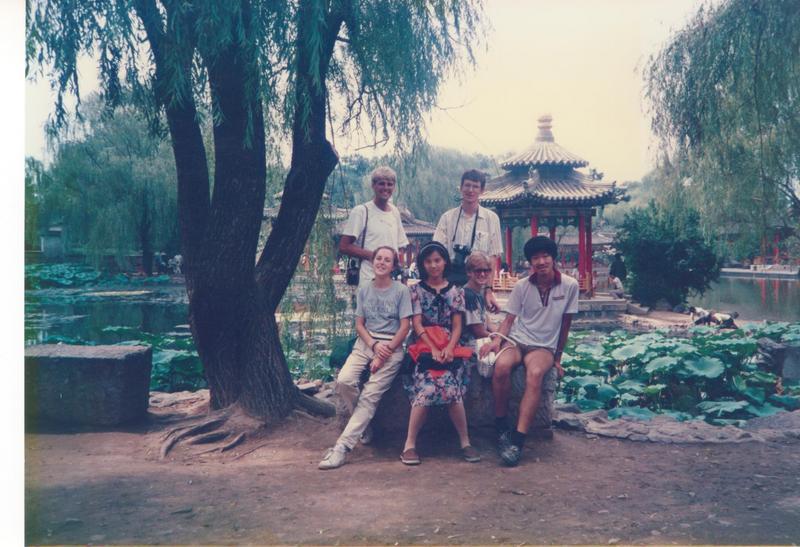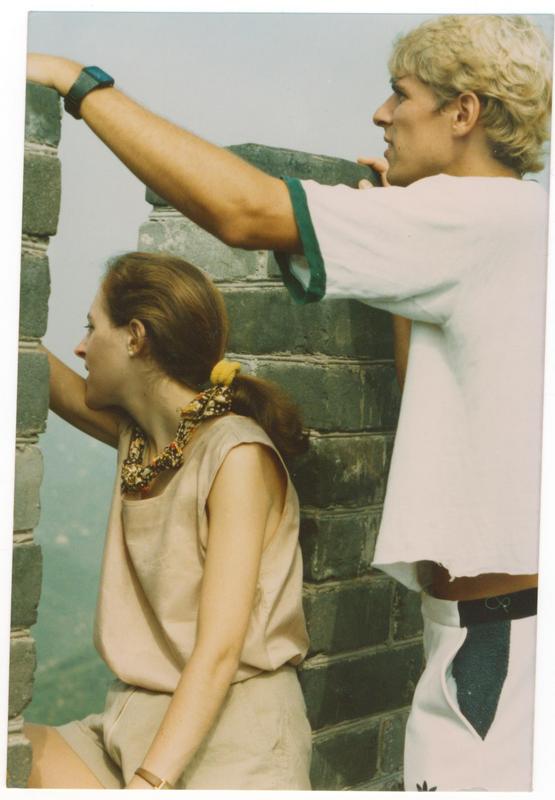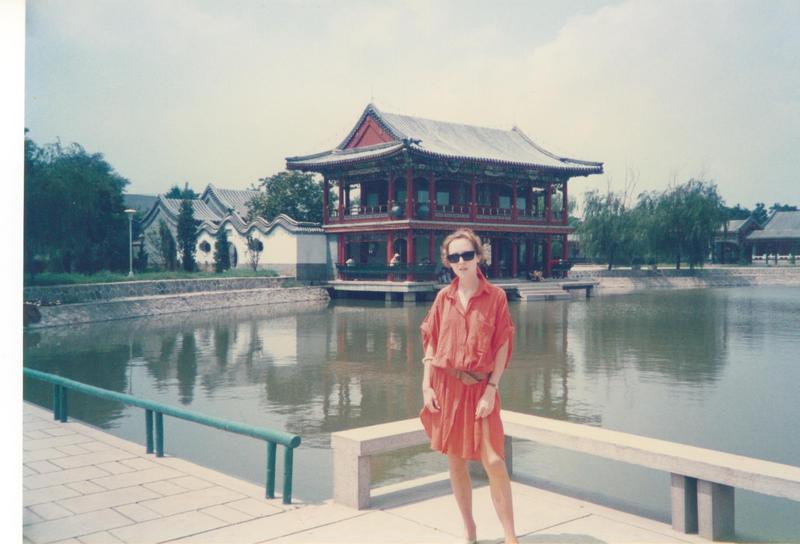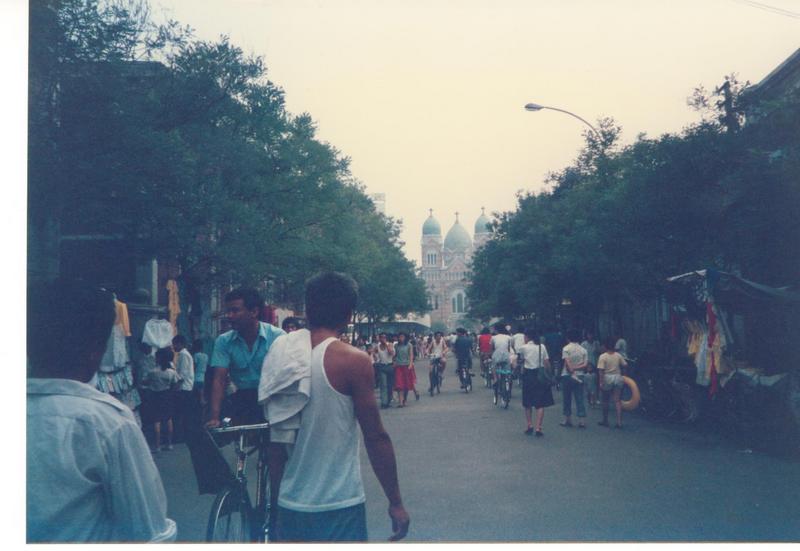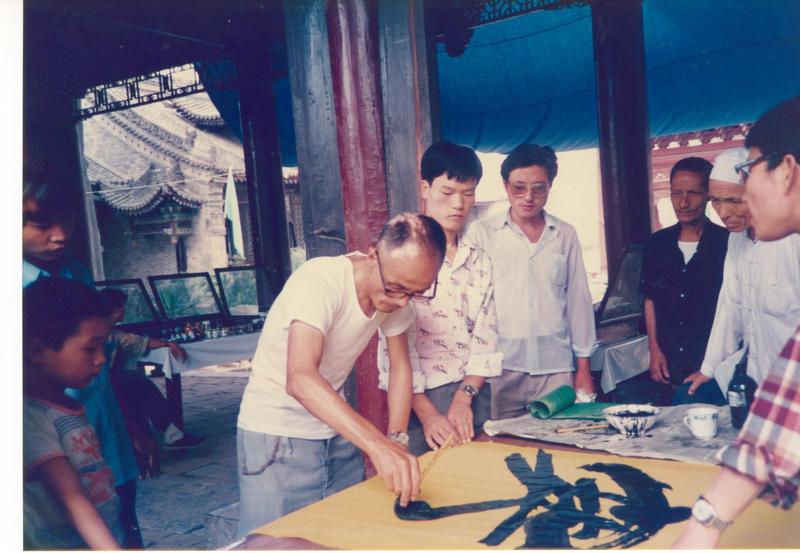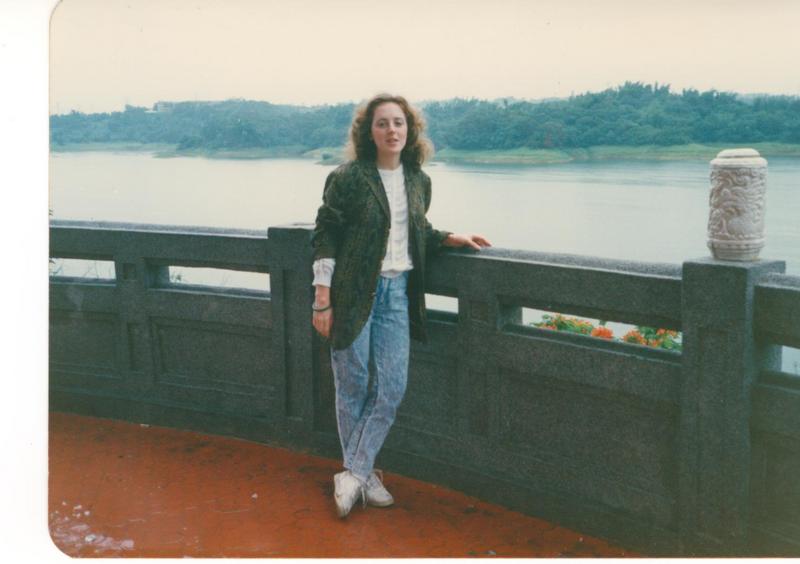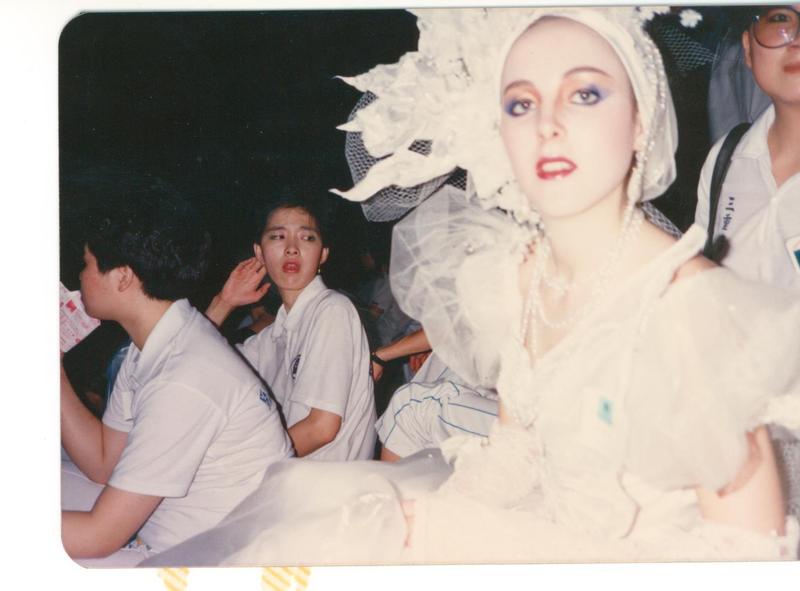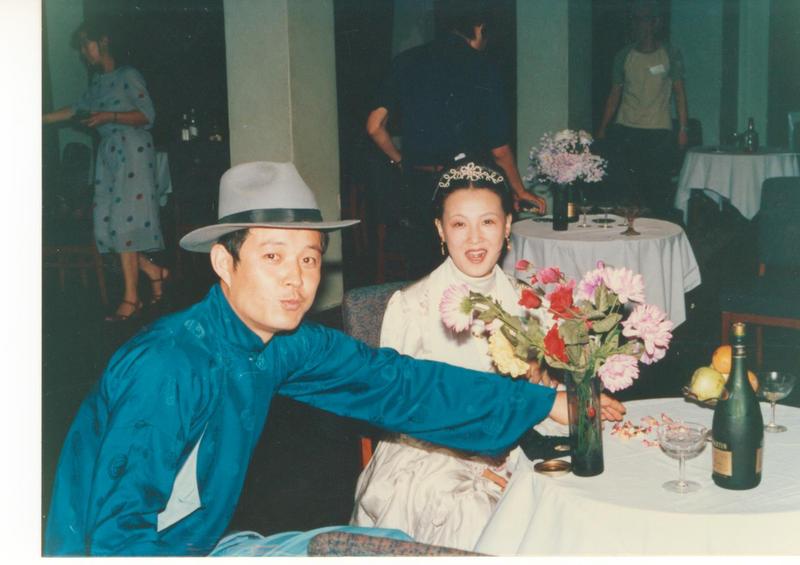Article
ChinaShock
Rhiannon Jenkins Tsang
China was not fashionable in 1986. My Oxford contemporaries thought I was crazy when I announced I was spending the summer in a Chinese High School in Tianjin, on a British Council, American Field Service Study Program. The main pre-occupations in the Junior Common Room, focused on obtaining mini pupillages at barrister’s chambers, placements at Goldman Sachs or the Conservative Central Office. For the leftists, it was about opportunities in the aftermath of the Miners' Strike or joining the anti-apartheid campaigning.
I did not know what to expect when I got to China. There was just a sense of excitement and exploration. In the back of my mind there were images of mass Maoist rallies and the great glories of Chinese art and culture. I much enjoyed and admired the latter in Oxford’s Ashmolean Museum. But it was to be neither, and was to be a huge shock.
For someone who had never been outside Europe and the United States, the journey itself was a slow cultural decompression deep dive. It was impossible to fly over Soviet airspace at that time and money was tight, so I flew Pakistan International Airlines with ten compatriots via Dubai, Karachi and Islamabad, over the Himalayas to Peking- as it was still called in the English speaking world in those days.
After a stop over in Dubai the plane filled with Chinese oil rig worker bearing all kinds of consumer goods that were unobtainable in China. Boxes of radio cassette players, colour televisions, hair dryers and curling tongs filled the isles and overhead lockers. Curly hair had been banned for women during the Cultural Revolution in China. But I remember seeing the boxes of curling tongs for wives and girl friends as a symbol of the hope in the air that summer - a hope that was dashed in Tiananmen Square only three years later.
Karachi and Islamabad were a blue and white riot of noise and heat; mosques, gaudy buses, road side cripples and a man from Bradford with a handlebar mustache and a Yorkshire accent like the cricketer Geoffrey Boycott, who did his best to sell us carpets. When we boarded the plane in Islamabad the maintenance men were still fixing the emergency exit and the cracks in the inside windows with brown parcel tape. We flew low over the Himalayas, the Chinese men smoking their way through the terrifying turbulence that sent tea cups flying and people bouncing around the cabin, hair dryers and televisions tumbling out of the overhead lockers. Luckily not many TV sets. But the views were worth it.
We arrived in Peking in the afternoon to a mountain of form filling. China was a closed economy and all foreign currency and electrical goods had to be declare on entry and accounted for on departure. My prized Ricoh camera had a whole form plus carbon paper dedicated to it. I shall never forget the faces of our hosts, the teachers from the school, who had come with the bus to meet us, tight with excitement, and something that I came to recognise as fear. We were to be the first foreigners to live outside the campus of the University of Nankai since the revolution in 1949, and we were their responsibility.
Driving out of Peking to Tianjin, now it was my turn to be afraid. Thousands and thousands of grey, blue and black Chinese gliding past my window on bicycles and not a car in sight. It took several hours to get to Tianjin along a narrow road that in places still had chickens and pigs roaming free. And then it was dark, truly dark, for there were no on-coming headlights, no bike lights and few street lights, just walls, eyes, shadows and shouts in the dark.
In the morning I awoke to find a young woman sitting on the edge of my bed. She was May (not her real name), the cousin of a teacher at Oxford who had written to her to tell her I was coming. She wore a white blouse, green skirt, white sun hat and white gloves. I gave her the gifts I had brought, tea and cloth for making dresses, but when she took off her sun glasses to thank me, I could see that she had been crying.
“When are you free to meet? I cannot come to the school again. They make me sign in here with my work unit and they ask all sorts of questions.”
Here was my first lesson about living in China, and I learned fast. I soon began to understand the patterns of fang and shou, releasing and pulling back, that characterize so much of China’s development at all levels over the last quarter of a century. On the one hand the school was able to provide beef, rather than pork for a Muslim member of our party, but on the other hand we were not allowed to use the school library. The school provided four Flying Pigeon bicycles for us foreigners to use (no mean feat for this was equivalent to providing people with cars) but as soon as we left the school gates, we were tailed by Public Security officers. On this occasion, my minders were already loitering at the door. May shoved some stamps and her address into my hand and told me to write to arrange out next meeting. We fixed on the following Saturday.
In pre air-conditioning summer heat, the routine at the school seemed relentless. Early morning classes in Mandarin, Chinese economics and Chinese history which were long sterile lectures from the Marxist perspective to the whirring of a single fan, Chinese art and before lunch taichi with Teacher Wu, a Chinese Muslim whose father had been a great Master. The cooler part of the later afternoons were spent on excursions, to a Chinese prison, a park, a carpet factory, Nankai University, the new Tianjin port, and one famous afternoon spent driving around the new showpiece Tianjin ring road.
I looked forward to meetings with May. But the first time I left the compound alone I was terrified. I sneaked out the back way by the coal shed to avoid the gate house and the Public Security Bureau tail. Walking the streets I was the odd one out, people stared and occasionally a child who did not know better, would shout, “Lao Wai!”(Old Foreigner). I had the impression I was living in a post apocalyptic black and white film that was running at half speed. Thin people walked and cycled slowly and apart from the Russian trams, pretty much everything appeared to have been left where it had fallen in 1949.
Together May and I explored Tianjin, going between the different foreign concession areas. I was fascinated. As an old treaty port the city had been divided up by the foreign powers, hence there was a British Concession with mock Tudor houses and a French concession with a cathedral modeled on the Sacré-Cœur and a long boulevard with plane trees and houses with wrought iron Parisian style windows and balconies. For a treat we went to the Kiesslings, the old German cafe. Sitting under the grimy chandeliers eating strawberries and ice cream, we looked up the current exchange rate in the People’s Daily and exchanged British pounds and a few Foreign Exchange Certificates (FEC) for renminbi. Foreigners were not supposed to hold local renminbi but only shop in Friendship Stores with FEC. I wanted renminbi for local purchases and May wanted foreign exchange, so the deal was done.
As the summer wore on, not used to living with constant restrictions and surveillance, we foreigners at the school began to chafe at the bit. There were lighter moments. We escaped one night to the Friendship Hotel to drink one beer each in the deserted 1950s Soviet style bar, there was a weekend in Peking and another time we worked as film extras for the Chinese television production of The Last Emperor, dancing in a ball scene which was filmed in the oak paneled ballroom of the former British Club in Tianjin. Nevertheless both sides could see that if something were not done to diffuse the tension, there would be trouble, and so a free long weekend was arranged.
Given the circumstances of the time it was amazing that May’s friend Bao Feng and her father, the Head Man in his village invited us both to stay with them. Telling no one where I was going except the Head of the British Delegation, I set off with May one afternoon on our Flying Pigeons to cycle to the village. She had never been there before and was following Bao Feng’s directions. We passed through several small towns and out into the countryside, riding along the middle of great empty roads which I soon realised had been built for the military. Night began to fall and we were lost. Far ahead on the road was a light. We cycled towards it. It was an army base. Cool as a cucumber, May gave me her sun hat and told me to tuck my long red hair up in it, put on my sunglasses and hide in the shadows at the edge of the cornfield. Then she pushed her bike up to the sentry box and asked for directions.
As last we arrived in the village after dark to a hero’s welcome, barking dogs, hot food and curious faces. They had been worried and search parties had been dispatched. That night I settled down to sleep with the girls on the kang, giggling together as we hunted mosquitoes amongst the shadows on the wall and told ghost stories. I fell asleep underneath a picture of Bao Feng’s father meeting Chairman Mao on the occasion he had visited the village, and felt at home for the first time in China.
The next days were spent cooking, talking, feeding the chickens and walking along the dykes and in the cornfields with the girls. We talked of boyfriends and our hopes and dreams and yet for all of us there seemed to be a tension between the two. With total linguistic immersion, at last I started to make sense of the rolling Rs of the local dialect and I could feel my Chinese coming alive. In the evenings the old people came to sit and talk.
“Yinggou? England? That is four days by train.” But amongst the jokes and beer I began to hear for the first time the sub text, the real stories of the Japanese occupation, starvation within living memory, beatings, forced collectivism and self criticisms. A morass of bitterness and suffering often mixed up in the tired memories of the old people.
Later when I finished the course at the school I traveled by train around China, eating sunflower seeds and sharing food with people on long journeys. People were afraid, but kind. Above all they wanted to talk, to show me their grandfather’s stamp album filled with foreign stamps which they had hidden under the floor boards to save from the Red Guards, to tell me of the time spent imprisoned in “cattle stalls” and boiling grass and tree bark to eat. I was young but I realized that people took risks to take me into their homes because they were pleased to see a foreigner back in China and I was a symbol of hope for better things to come.
In later years watching the energy, determination and at times utter ruthlessness with which China pursued economic development and modernization, I came to see it as born out of the period of intense national suffering, deprivation and indeed grief that had gone before.
The return flight to the UK was hair raising in a different way as we walked into the aftermath of a hijacking in Karachi, long before such things were remarked on, and were held at gun point in the sun on the runway by Pakistani soldiers. It was a relief to be finally on the plane home, albeit with our bags still left at gunpoint on the tarmac in Karachi. Deprived of milk and cheese for several months living on a Chinese diet, we begged the airline staff to ransack the galley for second and third helpings of milky rice pudding. In Dubai we marvelled at western toilets and bought a Mars Bar in the Duty Free to divide between us, savouring the sweet, chocolaty taste.
Back in Oxford in the October of 1986 I was a changed person and I was angry. I finished with the boyfriend I had at the time and that made him angry too as I could not explain why. I wrote in my crude classroom Chinese to May in China, but worried about the people who had shown me hospitality, in case the wind changed. Barely six months later I was back in the Far East again, this time studying and working in Taiwan and enjoying the glitz of the nineteen eighties boom years in Taipei and Hong Kong. But that, as they say, is another story.
© Moronic Ox Literary Journal - Escape Media Publishers / Open Books
Moronic Ox Literary and Cultural Journal - Escape Media Publishers / Open Books Advertise your book, CD, or cause in the 'Ox'
Novel Excerpts, Short Stories, Poetry, Multimedia, Current Affairs, Book Reviews, Photo Essays, Visual Arts Submissions
About the author:
Rhiannon Jenkins Tsang was born and educated in Yorkshire. As a young person she spent a lot of time in Europe, and speaks French, German and Spanish, as well as Mandarin Chinese and Cantonese. She read Chinese at Oxford and made her first trip to China, via Karachi and Islamabad, at the age of nineteen. She found a silent, black and white country largely abandoned since 1949, and a traumatised people emerging from the Maoist years, bravely hoping for better things.
She has worked in business in the UK and Taiwan and is a non practising lawyer. She runs Chinese language and cultural training courses for businesses with China links.
Rhiannon has worked as a freelance writer in Taiwan and was a runner up in the Woman and Home magazine short story competition. She has also had a short story about being an English mother with a baby in Taiwan, broadcast on BBC Radio Oxford.
She lives a traditional Nottinghamshire village with her husband, Steve Tsang, and their nine year old son. When not writing, doing school runs, or otherwise mothering, she enjoys walking, yoga, tennis and watching cricket.
Leaving British shores for China
aged 19
Chongqing Mists - August '86
At the site whereYang Guei Fei died Xian August '86
Orange dress and temple
French Cathedral - French Concession- Tianjin, 1986
Caligraphy
Sun Moon Lake
Modeling in Taipei
Movie Making - Emperor and Empress between takes
More Open Books titles for your enjoyment

